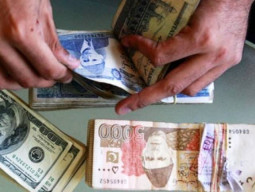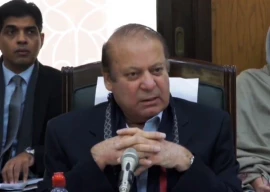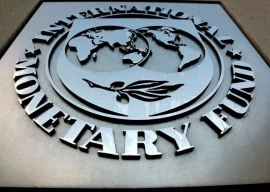
KARACHI: In what is being described as the most unfair business deal of the decade, the multi-billion-dollar Reko Diq copper-and-gold project has been placed at the mercy of a consortium of companies who may walk away with its riches, robbing the country of a golden opportunity to lift itself out of its growing external debt.
The consortium will take away 75 per cent of the income while the Balochistan government will get a paltry 25 per cent of share from the project as part of the terms of agreement.
Geologists have estimated that Reko Diq contains mineral deposits worth $500 billion and if the authorities did not take action immediately, this golden opportunity of turning around Pakistan’s fate will be lost.
Preparations are believed to be under way to sign agreements for mining and excavation with a consortium of foreign companies without any effort being made to estimate the actual worth of the vast gold and copper reserves found in the Chaghi district of Balochistan. According to geologists the actual worth of the reserves can be upwards of $500 billion. Economists say that the reserves are not only a solution to the nation’s economic woes, but can also help wipe out Pakistan’s debt.
Geologists associated with the Geological Survey of Pakistan had discovered huge reserves of gold and copper in Chaghi and adjoining areas in 1978-79.
After this discovery, international consultants of repute were commissioned to prepare feasibility studies about Saindak under the supervision of the Resource Development Corporation. They included Mountains Estates Enterprises (USA), Cel Trust Engineering (UK), Oto Kumpo (Finland), RTB Bor (Yugoslavia).
But after the Saindak study, instead of appointing international consultants for assessing the value and quantum of Reko Diq reserves, the Balochistan government entered into an agreement in 1993 with an Australian company having vast investments in oil and gas sectors under which 75 per cent of the reserves of Reko Diq were to be given to BHP Billiton, while 25 per cent share was to go to the government of Pakistan.
The drilling work for the feasibility study report was started under this agreement but in 2006, BHP Billiton suddenly sold its shares to Canadian company Barrick Gold which, in turn, sold half of its 75 per cent shares in Tethyan Copper Company (TCC) to Chile’s firm Antofagasta. This means that now Balochistan is owner of 25 per cent share in TCC while Barrick Gold and Antofagasta hold 37.5 per cent share each.
The TCC completed its feasibility report last year and claimed that the feasibility study and social and environmental analysis cost it $250 million while the overall estimate of the project – $3.3 billion – will be spent in the next 56 years.
According to geologists who played important role in the Saindak project, foreign companies make such agreements with developing companies to take advantage of their lack of funds and earn hefty profits by purchasing mineral reserves at throwaway prices.
They said that it was strange that the successful process of Saindak was not replicated in this case.
Analysts said that in Saindak, the drilling was done 91,000 feet deep while the cost was just $20 million while according to the TCC website, drilling on this project was only done till a depth of 21,000 feet.
They also contest the company’s claim about overall cost ($3.3 billion), calling it an exaggerated figure. They said it was not too late to get a consultancy firm hired to conduct a standard study. The services of Pakistani geologists can also be utilized for supervising the drilling work. According to the experts, the Balochistan government is not bound to assign the contract of mining and processing to the same firm which was given the licence for exploration.
Geology expert Dr Suhail M Qureshi said that Deko Riq reserves were being sold at very cheap prices. He said that according to the information received, the average price of gold and copper reserves is agreed to be $4,000 per ton which is too low. He said that an area of 25 square kilometers has been given on a 30 year lease.
Former finance minister Shaukat Tareen said that such conflicts can be averted if transparent procedures are adopted and national interest remains uppermost when concluding agreements for natural resources. He said that all the steps that the government of Balochistan is taking now to make the deal transparent should have been taken much earlier.
He said that according to his information, Reko Diq has the fifth largest reserves of gold and copper in the world and under the raw material agreement Pakistan will get $40 billion in 30 years. He said that if Pakistan makes the agreement for the refining process done in Pakistan, the price and income may increase by 7 to 8 times. He said that according to a safe estimate, the income can be raised to $500 billion.
According to Tethyan Copper Company spokesperson Ms Samia Ali Shah (Manager Corporate Communications) the total investment of the present co-owners of TCC is about $435 million, including the cost of acquisition.
Since 2006, about $220 million has been spent on exploration and technical studies. For mining and processing plant another “$3.3 billion will be required”
According to Ms Shah, once the Supreme Court hands down its verdict and all the negotiations are completed and necessary agreements signed, it will take about four years to build the infrastructure required to make the mine operational.
This means that any income from Deko Riq is not possible before 2015.
She confirmed that TCC is working under the same terms and conditions that BHP and government of Balochistan agreed upon in 1993.
She said that so far the feasibility study and environmental and social impact assessment reports have been completed and these are important milestones in the mining cycle which establish whether the project is financially and technically viable.
Published in The Express Tribune, January 12th, 2011.
















































COMMENTS (48)
Comments are moderated and generally will be posted if they are on-topic and not abusive.
For more information, please see our Comments FAQ